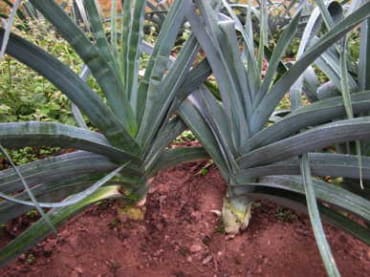(84 days) Open-pollinated. Beth Rasgorshek of Canyon Bounty in Idaho crossed King Richard with Siegfried Frost leek to create a versatile stable cultivar that has some of the good attributes of both. Sieg appears to have inherited the most from Siegfried. Its shanks are intermediate between the long King Richard and the short Siegfried, about 6" long but with a wonderful 3" thickness for a wide edible area. It also has some of Siegfried’s delightful blue-green coloration and delayed maturity. 2005 Fedco introduction. OSSI. Independent Breeder. ①
King Sieg Leek - Organic
King Sieg Leek - Organic
(84 days) Open-pollinated. Beth Rasgorshek of Canyon Bounty in Idaho crossed King Richard with Siegfried Frost leek to create a versatile stable cultivar that has some of the good attributes of both. Sieg appears to have inherited the most from Siegfried. Its shanks are intermediate between the long King Richard and the short Siegfried, about 6" long but with a wonderful 3" thickness for a wide edible area. It also has some of Siegfried’s delightful blue-green coloration and delayed maturity. 2005 Fedco introduction. OSSI. Independent Breeder. ①
Additional Information
Leeks
- 1 gram packet about 240–360 seeds, 1⁄16 oz packet ~400–600 seeds; 1 oz, 6,400–9,600.
- All leeks are open-pollinated.
Culture: Start indoors with onions and transplant out in spring almost as soon as the ground can be worked. Set 6–12" apart in trenches or well-dug beds with generous quantities of organic matter. Avoid transplanting next to grass strips; slugs love to dine on tiny allium seedlings. Irrigate seedlings whenever the topsoil dries out.
Summer leeks have tall shanks above ground and should be harvested before severe frosts. Hardier leeks have broader, shorter shanks and will hold till November. Leeks brought into the root cellar will survive almost all winter if heeled into soil. Leek seed is short-lived. Retest 1-year-old seed before using, and discard anything older.
Alliums
Culture: Start allium seeds indoors in February or March. Minimum germination soil temperature 45°; optimal range 60-70 °. We discourage using bottom heat because alliums germinate poorly in soil temps above 70°. Transplant in spring soon after the ground can be worked.
Alliums are heavy feeders and want generous amounts of organic matter, fertilizer and water. Late transplanting and poor fertility can result in small onions or failure to form bulbs. Alliums are notoriously intolerant of weeds. Slugs love to munch them, and in areas above 40° latitude, root maggots may be a problem.
About allium seed: Allium seed is short-lived. We do not hold over hybrid onion seed because of precipitous decreases in germination. Test 1-year-old seed before using. Discard anything older.
Diseases:
DM Downy Mildew
PR Pink Root
ALERT: Leek Moth is emerging as a serious pest potentially affecting all Alliums in the Northeast. Consult your local Cooperative Extension for more info.
Germination Testing
For the latest results of our germination tests, please see the germination page.
Our Seeds are Non-GMO

All of our seeds are non-GMO, and free of neonicotinoids and fungicides. Fedco is one of the original companies to sign the Safe Seed Pledge.





